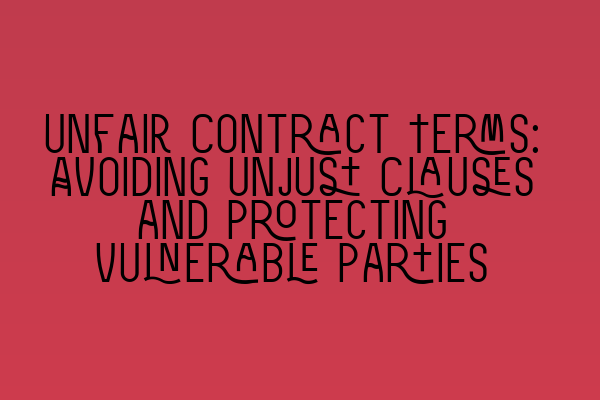Unfair Contract Terms: Avoiding Unjust Clauses and Protecting Vulnerable Parties
As a solicitor, it is crucial to ensure that your clients understand the implications of the contracts they enter into. One key aspect to consider is the presence of unfair contract terms, which can significantly impact the rights and obligations of the parties involved. In this article, we will explore the concept of unfair contract terms, how they can affect vulnerable parties, and the steps you can take to avoid unjust clauses.
Understanding Unfair Contract Terms
Unfair contract terms refer to provisions in a contract that create an imbalance of rights and obligations between the parties involved. These terms are deemed unfair if they cause a significant financial or other disadvantage to one party, while providing a substantial benefit to the other, and if they are not reasonably necessary to protect the legitimate interests of the advantaged party.
The purpose of regulations surrounding unfair contract terms is to safeguard vulnerable parties, such as consumers and small businesses, from exploitation by more powerful entities. By ensuring that contracts are fair and balanced, these regulations aim to promote a level playing field and prevent unfair advantage.
The Impact on Vulnerable Parties
Vulnerable parties, including consumers and small businesses, are often at a disadvantage when negotiating contracts with larger corporations or more experienced counterparts. They may lack the resources, knowledge, or bargaining power to fully understand and negotiate contractual terms. This power imbalance can result in the inclusion of unfair clauses that heavily favor the stronger party.
Unfair contract terms can detrimentally affect vulnerable parties in numerous ways. They may limit their ability to seek redress for breaches, impose exorbitant fees or penalties, or unreasonably restrict their rights or choices. Such terms can also create unfair barriers for vulnerable parties to exit contracts or negotiate fair amendments.
Avoiding Unjust Clauses
As a solicitor, it is your responsibility to identify and omit unfair contract terms from your clients’ agreements. Here are some essential steps to take:
- Educate your clients: Ensure that your clients understand their rights and the importance of fair contractual terms. Advise them on specific clauses to look out for and the potential consequences of accepting unfair terms.
- Review contracts carefully: Thoroughly examine the terms and conditions of any contract to identify any potentially unfair or unreasonable provisions. Pay particular attention to clauses that limit liability, impose unilateral changes, or restrict the legal remedies available to your client.
- Negotiate amendments: Engage in negotiations with the other party to amend or eliminate unfair terms. Use your legal expertise to secure more equitable provisions that better protect your client’s interests.
- Seek legal advice: If you believe a contract contains unfair terms that cannot be successfully negotiated, consult with a barrister or seek guidance from legal experts specializing in contract law.
By diligently following these steps, you can significantly reduce the risk of your clients being bound by unjust clauses and ensure their contractual agreements are fair and balanced.
Conclusion
Identifying and avoiding unfair contract terms is crucial in protecting vulnerable parties and promoting fairness in contractual relationships. As a solicitor, it is your duty to educate your clients on their rights, carefully review contracts, negotiate amendments, and seek legal advice when necessary. By doing so, you contribute to a more just and equitable legal landscape.
For more legal insights and guidance, check out our related articles:
- Navigating Legal Challenges and Pitfalls in Your Practice
- Barrister vs. Solicitor: A Comprehensive Comparison
- Exploring Different Solicitor Specializations: Finding Your Niche
- Top Recommendations for Law Schools in the UK
- Embracing the Rise of Virtual Law Practices
Remember, as a solicitor, your commitment to protecting vulnerable parties and advocating for fairness is paramount in upholding the ideals of contract law.
